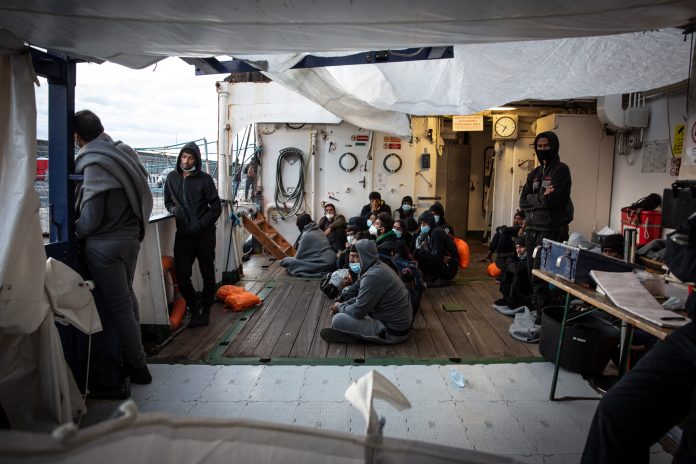Italian authorities have for the second time in recent months detained a 69-metre (225ft) vessel operated by European group SOS Mediterranee, as part of the enforcement of an Italian government decree passed a year ago that oversees maritime rescue organisations.
Prime Minister Giorgia Meloni’s government approved the decree as part of efforts to stem the flow of migrants and potential asylum seekers trying to reach Europe. Italian maritime authorities now regularly dispatch private rescue vessels to ports in central and northern Italy, hundreds of miles and days away from where they find boats in distress. Alessandro Porro, a senior rescuer and president of SOS Mediterranee’s Italy operation, said:
“We are accused of not having followed the orders of the Italian coast guard, and the only fault we have is that of having followed the law of the sea.”
After arriving in Bari on 30 December, the crew received a 20-day detention order for the vessel and a fine of 3,300 euros ($3,600). The detention order expires on Friday and SOS Mediterranee hopes the vessel will set sail again if the weather permits. Mary Finn, another Ocean Viking rescuer, said:
“We know this is a tactic to try and stop our operation rather than something that is valid in some way. And I find it painful to feel that humanity’s not on our side or that the authorities aren’t on our side, because it’s so obvious when you do this work that what we’re doing is the right thing to be doing.”
Sara Kelany, migration policy coordinator of Meloni’s Brothers of Italy party said that the presence of charity ships in the Mediterranean Sea should be limited and strictly regulated. Kelany argues that many groups organising humanitarian missions in the Mediterranean Sea also have a political goal of influencing the European Union’s migration policy. She said in an interview:
“In essence, they want to be political actors within the dynamics of immigration. Immigration is a state’s national competence, and we cannot allow private organizations to influence our migration policies with their policies.”
According to UN and Italian statistics, more than 60 per cent of the 260,000 people who reached Europe last year via the Mediterranean from North Africa first arrived in Italy.
Meanwhile, according to the International Organisation for Migration, more than 3,000 people drowned at sea in 2023 while trying to swim across the Mediterranean. In total, more than 28,800 people have died or gone missing in the Mediterranean Sea since 2014.
After coming to power at the end of 2022, Meloni’s government promised to limit the arrival of migrants. Instead, however, their numbers have soared in Italy, with more than 157,000 in 2023, up from 105,000 the year before. On one day in September, more than 7,000 migrants arrived on the island of Lampedusa.
More recently, Meloni has concluded a bilateral agreement with Albania to set up two centres in the Balkan state to speed up the processing of asylum claims for migrants who were rescued by Italian navy, coast guard and border police ships. Albania’s constitutional court suspended the deal pending a review, but Prime Minister Edi Rama said he expects it to continue.
